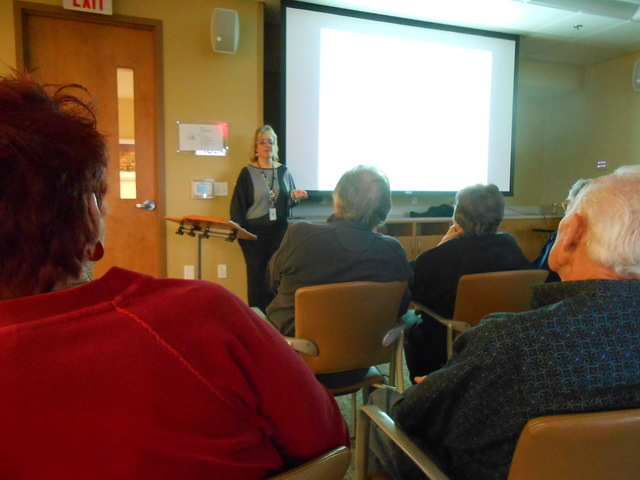Holly Daze event gives mental health tips for traversing holiday season

The holidays are supposed to be filled with good cheer, but for some, it can be tough to smile.
On Nov. 20, the Southwest Medical Associates Lifestyle Center-West hosted a Holly Daze open house to discuss combating seasonal affective disorder, or what some refer to as a depressive state known as “the holiday blues.”
Stacy Hakes, a certified therapist, was on hand at the center, 8670 W. Cheyenne Ave., Suite 105, to provide a guide for holiday stress management.
“There are lots of dynamics with family … Family can make you want to pull out your hair,” she said. “And how big a stress (inducer) is money? At holiday time, it’s even more so.”
To avoid stress, she said to watch out for the four F’s — fantasy, family, food and fitness.
Dorothy Arnold was in the audience. She lost her husband in 1975 and said she handles being alone during the holidays by inviting other singles to her house to celebrate together.
“I invite people who have no other place to go,” she said.
Beth Francis, a Summerlin-area resident, said her holidays were made easier after her children changed religions to become Jehovah’s Witnesses and stopped observing Christmas.
“At first it bothered me a great deal because of the grandchildren,” she said. “But after a couple years, I realized (that) it set me free. Now, we travel; it’s wonderful. I don’t have to buy Christmas presents or cook fancy dinners.”
Just as stress factors into SAD, Hakes said so do other winter season realities, such as less sunshine, which underlines a sense of dreariness. Then there’s the tendency to review the year and ask, “What did I accomplish?”
“For some of us, the holiday season marks ‘the first’: the first holiday without a loved one,” Hakes said. “It can be difficult to engage in joyous activities. You stay home; you don’t answer the phone.”
Psychiatry.org says symptoms of SAD often appear in the colder months of fall and winter, when there is less sunlight during the day. Those who work long hours in buildings with few windows may experience symptoms year-round. The disorder is linked to a biochemical imbalance in the brain prompted by shorter daylight hours and a lack of sunlight in winter. As seasons change, people experience a shift in their biological internal clock or circadian rhythm.
According to Hakes, signs of depression include a sense of fatigue, difficulty with sleep patterns (either sleeping too much or insomnia), worrying about things you don’t normally dwell on and/or negative feelings about yourself. Later, more serious signs include significantly less productivity, feelings of hopelessness and/or helplessness, loss of interest in things that once brought you joy, uncontrollable despair and thoughts of suicide.
Hakes said to combat holiday depression, try something new, start a new holiday tradition, volunteer your time to help others and get some exercise, even if it’s just a walk. She also recommends making a list of things for which you’re grateful.
For an instant pick-me-up, visualize a time in your life when you were “rolling on the floor” laughing, so hard that it hurt.
“It brings you back to a time when things were good, and you were happy,” Hakes said. “It’ll put a smile on your face.”
For more information, call Behavioral Healthcare Options Inc. at 800-559-9749.
Contact Summerlin Area View reporter Jan Hogan at jhogan@viewnews.com or 702-387-2949.
Managing holiday stress
Therapist Stacy Hakes advises not to use holiday time to try and resolve long-standing conflicts. Her other suggestions for managing holiday stress are:
Make a holiday budget and stick to it.
Have realistic expectations.
Maintain healthy habits when it comes to rest, food and exercise.
Shop weekdays to avoid the hassle of crowds or skip the mall and shop online.
Pace yourself and balance social time with solace.
Find one great gift and send one to multiple people.
Task others with certain responsibilities, such as cooking, cleaning or decorating.
— Jan Hogan, View staff writer


















